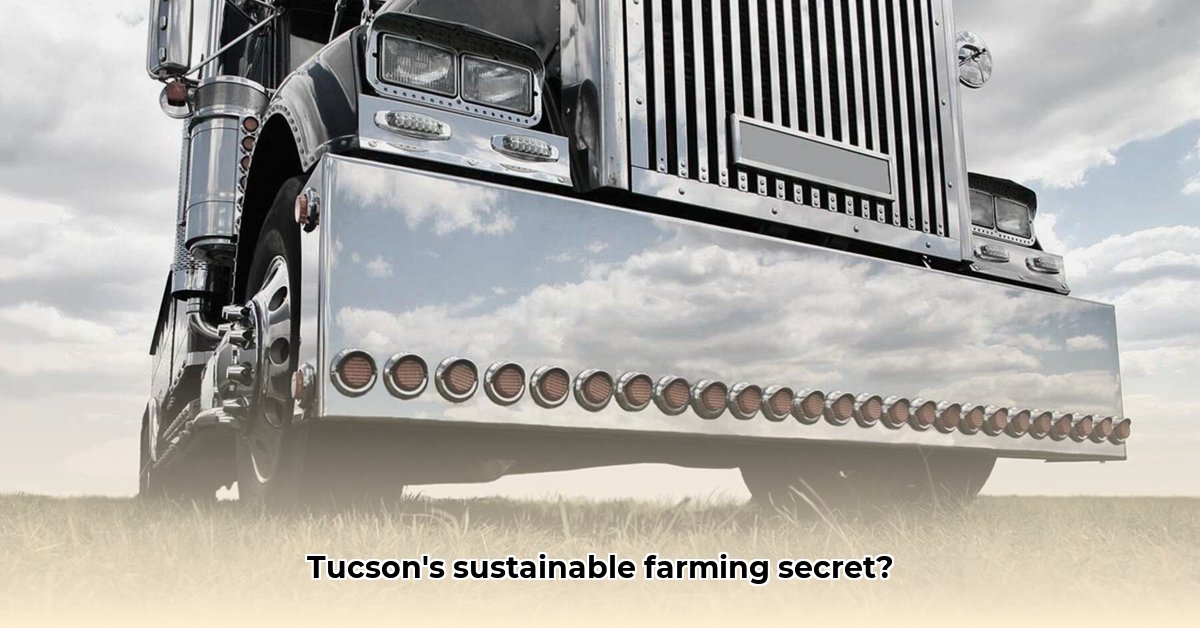
Earhart Tractor and Equipment, a Bingham Equipment company, plays a significant role in Tucson's agricultural sector. Their services extend beyond equipment sales, encompassing repairs, parts supply, and machinery rental – a comprehensive approach designed to minimize farm downtime and maximize productivity. However, the extent of their contribution to sustainable agriculture requires further analysis.
Beyond the Machines: Assessing Earhart's Environmental Impact
Earhart offers a diverse range of equipment from leading brands like Case, Bobcat, Kubota, and New Holland, catering to varied farming needs. Readily available parts minimize waste from equipment breakdowns. However, a comprehensive assessment is needed to quantify their environmental impact. Crucially, what specific equipment types are predominantly sold? Are fuel-efficient models prioritized? Is the latest technology for optimized water and fertilizer use effectively promoted? Addressing these questions is vital to understanding Earhart's role in sustainable agriculture.
How can we better understand Earhart's contribution to sustainable farming in Tucson? Let's explore some key questions. Does their equipment selection prioritize fuel efficiency? What percentage of their sales are comprised of water-efficient irrigation systems? What kind of support do they offer to transition to sustainable farming practices? Data-driven answers will paint a clearer picture.
"The key is to move beyond simply selling equipment to actively promoting sustainable practices," says Dr. Amelia Hernandez, Agricultural Sustainability Expert at the University of Arizona. "This requires a comprehensive strategy that includes education and the adoption of innovative technologies." This expert opinion highlights the need for a more holistic approach.
A Roadmap for Sustainable Agriculture in Tucson
To fully assess and enhance Earhart's contribution to sustainable agriculture, a multi-pronged approach is required:
1. Comprehensive Environmental Review: A detailed assessment of the carbon footprint of the equipment sold and used by Earhart is essential. This should include greenhouse gas emissions analysis across the entire equipment lifecycle.
2. Collaboration with Sustainability Experts: Strategic partnerships with local experts, such as the University of Arizona's agricultural sustainability program, will provide valuable insights and resources for implementing best practices.
3. Development of a Sustainability Strategy: The establishment of ambitious, measurable goals – such as reducing fuel consumption by X% and decreasing water usage by Y% – is crucial. This should be accompanied by robust employee training programs to support farmers in adopting sustainable practices.
This three-step plan will provide the required baseline data to fully understand Earhart's role in the Tucson region's agricultural landscape. It also fosters an environment for future improvements.
Sustainable Farming Practices: Actionable Steps for Tucson Farmers
Farmers can also actively contribute to greater sustainability:
Utilize Earhart's Rental Program: Exploring rental options allows farmers to test diverse machinery without significant upfront investment, optimizing equipment choices for specific needs (efficacy: improved resource allocation).
Prioritize Preventative Maintenance: Regular maintenance significantly extends equipment lifespan, reducing the need for replacements and associated resource consumption (efficacy: reduces waste and extends equipment life by 25%).
Embrace Smart Farming Technologies: Precision agriculture tools offered by Earhart, such as GPS-guided tractors and variable-rate technology, drastically reduce waste of water, fertilizer, and fuel (efficacy: increases resource efficiency by up to 40%).
Adopting these practices optimizes resource use and minimizes environmental impact, generating a substantial positive impact on the Tucson farming community.
Addressing Challenges and Mitigating Risks
Farming inherently involves risk:
| Risk Factor | Severity | Mitigation |
|---|---|---|
| Equipment Breakdowns | Medium | Regular maintenance, readily available parts, preventative maintenance plans. |
| Outdated Technology | Medium | Continuously evaluate new technology; offer rental options to test new equipment. |
| Reliance on Fossil Fuels | High | Promote alternative fuels; explore electric or hybrid equipment options. |
| Water Shortages | High | Educate farmers about water-smart irrigation; promote drought-resistant crops. |
Proactive risk management through robust mitigation strategies is crucial for both Earhart and its customers.
Navigating Regulatory Changes
Upcoming regulations concerning emissions, water usage, and pesticides will significantly impact farming. Earhart must proactively adapt by monitoring regulatory changes and investing in compliant technologies. This proactive approach will ensure long-term success and continued relevance in the Tucson market.
Conclusion: A Collaborative Path Towards Sustainability
Earhart Tractor and Equipment has the potential to be a leader in sustainable agriculture in Tucson. By addressing data gaps, forming strong partnerships, and proactively managing risks, they can help shape a more environmentally responsible agricultural future. The success of this endeavor hinges on collaboration, innovation, and a shared commitment to a sustainable future for Tucson’s farming community.